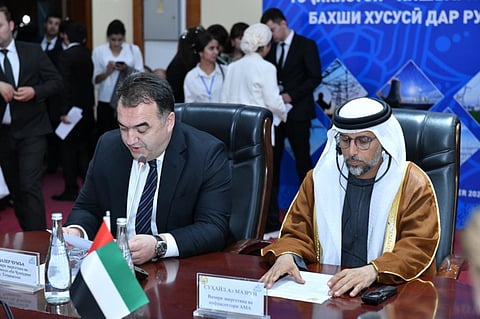Masdar Enters Tajikistan Market with Plans to Explore 500MW Clean Energy Projects
MW Energy, a joint venture between Masdar and W Solar Investment, has signed an agreement with Tajikistan’s Ministry of Energy and Water Resources (MOEWR) to explore at least 500 MW capacity of clean energy projects, including floating solar power and hydropower, in landlocked and water-abundant Tajikistan.
The MoU was signed during the Dushanbe International Investment Forum. With an abundance of lakes, rivers and glaciers, Tajikistan relies on hydropower and has huge potential for growing other renewable energy sources.
The collaboration aims to develop projects, including solar PV, wind and hydropower, as part of a Public-Private Partnership (PPP). Phase one targets a minimum total capacity of 500MW.
The signing was witnessed by The UAE Minister of Energy and Infrastructure, H.E Suhail Al Mazrouei, and Minister of Energy and Water Resources of the Republic of Tajikistan, HE Daler Jum’a.
Also present were H.E Dr Mohamed Alariqi, Ambassador of the UAE to the Republic of Tajikistan, and HE Bahodur Sharifi Mahmudzoda, Ambassador Extraordinary and Plenipotentiary of the Republic of Tajikistan to the UAE.
H.E Suhail Al Mazrouei, UAE Minister of Energy and Infrastructure, said: “The UAE is proud to be partnering with Tajikistan to explore cutting-edge renewable energy projects to help increase energy security and reduce carbon emissions.
"As the UAE looks forward to hosting COP28 we will continue to work with nations to accelerate the path to a net-zero future.”
H.E Daler Jum’a, Minister of Energy and Water Resources of the Republic of Tajikistan, said: “Tajikistan is committed to increasing its installed electricity generation capacity and growing its promising green energy sector.
"Our land is blessed with many natural resources, and we look forward to working with partners to harness this potential and meet our energy and development goals.
“A significant increase in generation is planned through the introduction of renewable energy.
"By 2030, the installed capacity of generating stations using solar and wind energy should be 700 MW; today, 450 MW of this is being developed by a feasibility study with the participation of international consulting companies with the financial support of international financial institutions.
"This is a relatively new direction for us, but nevertheless concrete work has already begun.”
Mohamed Jameel Al Ramahi, Masdar’s Chief Executive Officer, said: “As Masdar and W Solar mark our entrance into the Tajikistan market, this partnership demonstrates the impressive range of utility-scale renewable energy expertise we are able to bring to the table.
"We look forward to supporting the Republic of Tajikistan with its renewable energy goals and harnessing the abundant power of the nation’s sun, wind and water to generate clean energy and drive sustainable development.”
Mr Muhammad Zafar, CEO of W Solar, said: “Our collaboration with Masdar in Tajikistan is a testament to W Solar’s unwavering commitment to advancing renewable energy across the globe.
"This venture in Tajikistan is not just about energy generation, but about building resilience, empowering communities, and contributing to a greener planet.”
Central Asia is a key investment destination for Masdar. As one of the world’s largest renewable energy companies, it has developed several landmark projects including the region’s largest wind farm, the 500MW capacity Zarafshan plant in Uzbekistan.
Masdar has also reached financial close on three Uzbek solar projects in Jizzakh, Samarkand and Sherabad, which have a combined capacity of around 900MW – making it the largest solar development program in Central Asia.
Masdar’s 100MW Nur Navoi Solar Power Project in Uzbekistan has been operational since 2021. Other key developments in the pipeline include the 250MW Nur Bukhara Solar Power Project with 63MW/126MWh battery energy storage system.


